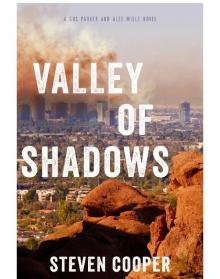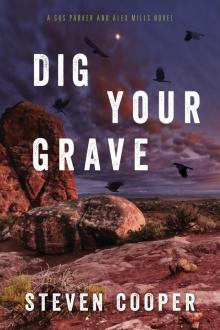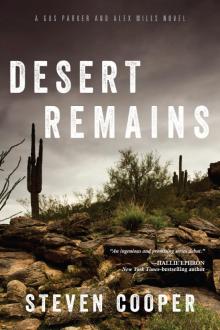- Home
- Steven Cooper
Desert Remains
Desert Remains Read online
Published 2017 by Seventh Street Books®, an imprint of Prometheus Books
Desert Remains. Copyright © 2017 by Steven Cooper. All rights reserved. No part of this publication may be reproduced, stored in a retrieval system, or transmitted in any form or by any means, digital, electronic, mechanical, photocopying, recording, or otherwise, or conveyed via the Internet or a website without prior written permission of the publisher, except in the case of brief quotations embodied in critical articles and reviews.
Cover image © Shutterstock
Cover design by Nicole Sommer-Lecht
Cover design © Prometheus Books
This is a work of fiction. Characters, organizations, products, locales, and events portrayed in this novel are either products of the author’s imagination or used fictitiously.
Inquiries should be addressed to
Seventh Street Books
59 John Glenn Drive
Amherst, New York 14228
VOICE: 716–691–0133 • FAX: 716–691–0137
WWW.SEVENTHSTREETBOOKS.COM
21 20 19 18 17 5 4 3 2 1
Library of Congress Cataloging-in-Publication Data
Names: Cooper, Steven, 1961- author.
Title: Desert remains : a Gus Parker and Alex Mills novel / Steven Cooper.
Description: Amherst, NY : Seventh Street Books, an imprint of Prometheus Books, 2017.
Identifiers: LCCN 2017020340 (print) | LCCN 2017023972 (ebook) | ISBN 9781633883543 (ebook) | ISBN 9781633883536 (paperback)
Subjects: | BISAC: FICTION / Mystery & Detective / Police Procedural. | GSAFD: Mystery fiction.
Classification: LCC PS3603.O583 (ebook) | LCC PS3603.O583 D47 2017 (print) | DDC 813/.6—dc23
LC record available at https://lccn.loc.gov/2017020340
Printed in the United States of America
In Memory of
Dr. Alvan Fisher
And his son, Jeremy
Leanne Fisher Gitell
Ruth Kane Goldman
CONTENTS
Cover
Title Page
Copyright Page
Dedication
1
2
3
4
5
6
7
8
9
10
11
12
13
14
15
16
17
18
19
20
21
22
23
24
25
26
27
28
29
30
31
32
33
34
35
36
37
38
39
40
41
42
ACKNOWLEDGMENTS
AUTHOR’S NOTE
ABOUT THE AUTHOR
1
Her name is Elizabeth Spears.
She has blue eyes and short blond hair.
Her address is 9223 South Nightbird Trail. That’s nearby in a section of Phoenix known as Ahwatukee. Many people don’t like to say Ahwatukee because the word sounds kind of doltish, especially the accent on TOO-key, and the name is often met by nervous laughter and blushing faces as if it’s the Native American word for “toilet,” which it isn’t. The translation is really quite lovely, romantic even. Ahwatukee comes from the ancient language of the Pima Indians, and it means “House of Dreams.”
Elizabeth Spears is twenty-seven years old.
Her birthday was last month.
She’s five feet six inches tall. Although it’s hard to tell from this angle.
She is bejeweled. A string of shimmering stones clings to her wrist, likewise her neck, in hues of amber and gold, like the hues of the cave that shelters her.
Elizabeth Spears is an organ donor.
Homicide detective Alex Mills of the Phoenix Police Department hands the victim’s driver’s license to another investigator at the scene and now kneels beside the body. One. Two. Three. Four. He’s counting the stab wounds. Careful not to contaminate or alter the scene, the crime techs are surrounding the body like a surgical team. He doesn’t want to get in the way. There’s blood everywhere. Five. Six. Seven. They all have a job to do. There are rubber gloves and flash photography. Yellow tape and tweezers. Eight, nine, ten. Eleven. For all this commotion, he hears very little beyond his own counting. There is a stillness here in this barren cave in the middle of the desert, and Mills knows instinctively that stillness is all that there ever was and all that there ever will be. He understands this quiet reverence of the desert where winds blow in flawless circles, sometimes rising to the sky in pillars of swirling dust, sometimes hushed and invisible like the modesty of prayer.
It’s five thirty. The sun won’t set for two more hours. The slow unfolding of gold has just begun, as it always does, still yellowish now, still yellowish for a while, and then there will be the perpetual anointment of the desert, that timeless sanctification, that brings beauty to this desolate place. Tonight the beauty will be haunting when it collides with evil.
Mills rises slowly. When he turned forty a few years back, the new decade in life immediately yanked at his knees, greeting him with the ache and pain of every jump shot, every sprint, every hurdle he had ever performed in his quest for athletic excellence, which, he had promised himself, would compensate for his academic mediocrity. For the most part it had. And then one day, just one day out of nowhere, he started reading. Okay, that’s not exactly true. One day he met an English major named Corinne Wiley who was as head over heels in love with literature as he was with her. Dickens was the fastest route to her heart. So was, God help him, Shakespeare. Corinne married a dentist, but Mills still loves a good book.
He studies the wall of the cave. Finally he gets a good view. Every responder had all but genuflected in front of that wall like sycophants at an art professor’s opening. Mills understands the fascination; he feels it bubble in his blood. About an hour before, when he had first arrived at the crime scene, one of the other detectives, he thinks it was Chase, pointed at the wall and said, “What the fuck is that?”
“That ain’t no petroglyph,” the police photographer replied as he started to burst out shots, some with flash, others without.
“No shit,” Chase barked. “Unless we got a new tribe that just arrived in the desert and started sacrificing people.”
“For all we know it’s illegal immigrants. I mean, hell, they’re the newest tribe.”
Mills knows who said that. It was Detective Morton Myers. Morton Myers is an English-only ton of lard who couldn’t chase a tortoise from a crime scene if his next Double Whopper with cheese depended on it.
Mills soaks in the desecration of the cave. In the absence of a body it would be horrible vandalism. In the presence of a body it’s horrifying.
The killer left a portrait of the murder.
A rude carving, at least ten feet wide and five feet tall, depicts a man in a cowboy hat, perhaps a bandana as well, plunging a knife into the chest of a woman bent over his knee.
Alex Mills looks down at Elizabeth Spears and confirms that the chest wound on the wall matches a chest wound on her body. He looks back to the drawing. In it Elizabeth’s eyes are wide with terror. Her mouth is twisted. The artwork is elementary at best. A fifth grader’s rendition of bloody murder.
Mills steps away from the circle of dried blood around the body of Elizabeth Spears and takes a wider view of the scene: This cave, just below a hiking trail, just above a pebbly wash; this body exposed as if there
were nothing to hide. Nearly open to the public. A vista in itself.
Elizabeth Spears could not have been dead for very long.
There is no evidence her body had been visited upon by carnivores. No signs at all that she had been taken for carrion.
A male jogger who is still out there somewhere talking to investigators discovered her body. Mills consults his notebook. Mark Green. That’s his name, the jogger who found the body and then vomited several times before he could compose himself enough to dial 911.
“Is that your vomit?” Myers had asked him, pointing to the overlapping piles on the ground.
Mark Green nodded. “Yeah,” he said. “Is it some kind of evidence?”
“It’s evidence you got a weak stomach, heh-heh,” the detective told him.
Myers needs a desk job desperately.
Detective Alex Mills needs some evidence desperately, some leads, the ah-hah moment, if you will. If there is evidence of a struggle it has been erased, presumably by a meticulous killer who wants the only version of the crime to be the version he has carved into the wall.
He has left behind no murder weapon.
He has left behind no carving tools.
He has left behind Elizabeth Spears, probably a hiker or a jogger, a young woman who’s maybe a regular out here, who finds her solace here or her joy, who sees the desert as a gift to be taken, a gift to be used with pious respect. Or maybe this was her training ground, her proving ground.
Maybe the killer was not a man.
The calamitous crankology of maybes begins to rattle like pots and pans in Detective Alex Mills’s sleuthish brain. And now he feels empowered by the crankology. The crankology is his real training ground; it is also his mojo.
Mojo, shmojo.
Mills can already hear the TV choppers fluttering above like big, beastly carcass seekers. He knows a swarm of reporters cannot be far behind. Timothy Chase, the scene investigator, has told a few officers to tape off the trailhead.
Mills looks again at the body of Elizabeth Spears and, as he always does when he is sent to a murder scene, begins to interview the victim.
Who are you? he asks. What happened here?
2
First he stares at the gallbladder. Then at the pancreas. He’s not a big fan of the pancreas and here’s why: it goes bad, you go bad. The pancreas has more potential to kill you than most other organs. Now he looks at the liver. Unless you’re an alcoholic, your liver is most often unremarkable, a few benign hemangiomas notwithstanding. Then it’s on to the left kidney: clear. He sees a tiny something or other on the right kidney, like a chickpea the size of a thumbtack. He doesn’t say anything. He doesn’t ever say anything. He’s not supposed to say anything; instead he says, “Okay, Mrs. Golding, we’re done. We’ll have the report to your doctor in a few days. You may get dressed now.”
Mrs. Golding, age fifty-four, 180 pounds, divorced, nonsmoker, allergic to penicillin and mushrooms (on the following medications: Lipitor, Boniva, Xanax, and Zoloft), history of cancer maternal side, history of heart disease paternal side, history of diabetes both sides, rises from the table with a wince. She is perfumed and powdered.
“Are you okay, Mrs. Golding?” he asks as he helps her down.
“I’m fine. Just a little sore from the table.”
“I’m sorry.”
“Did you see anything I need to worry about?”
He takes her arm and escorts her from the room. “The radiologist will look at the ultrasound and write up a report for your doctor.”
“I know, I know. But did you see anything unusual? You must know when something looks different.”
Ushering her into the changing room he says, “I’m not trained to interpret the test, Mrs. Golding.”
“Thank you—what did you say your name was?”
“Gus.”
“Thank you, Gus. I really hope I’ll be okay.”
He knows she’ll be fine.
Gus Parker knows this because Gus Parker has a sixth sense. That is not to say that he sees dead people. That is not to say that he can always predict the future. He completely missed the Michael Jackson thing. He also missed his father’s golf cart accident. His father is alive and well and still not talking to Gus, not because Gus missed the unfortunate afternoon when Warren Parker, distracted by the suddenly developed bust of Horace Michael’s daughter, Rachel, drove his cart into a sand trap and broke an ankle and a wrist. His father is still not talking to him because Gus is the crazy son from the dark side of the world. One miss that still haunts him almost twenty years later: the 2000 presidential election. He didn’t see the clusterfuck that was to become Florida.
Gus Parker describes himself as highly intuitive. Others who know him say he’s a psychic. A reluctant psychic, maybe, but a psychic nonetheless. It doesn’t exactly pay the rent because he doesn’t exactly have a TV show, which is why he works here at Valley Imaging as a jack-of-all-organs, multi-certified in mammography, sonography, CT, MRI, you name it, except X-rays; he has a grudge against X-rays.
Call it intuitive or call it psychic, Gus is not at all surprised when he gets a call after Mrs. Golding’s ultrasound from Beatrice Vossenheimer.
It went something like this:
“You still in, baby?”
“In?”
“Tonight . . . Eric Young.”
“Where?”
“Books, Books & Beyond. Fashion Square.”
“Oh, right. Of course.”
“If you can’t make it . . .” she chirps.
“No. Of course I can. I’ll meet you at your place after work.”
“I’ll have dinner ready, Gus.”
She disconnects.
Beatrice Vossenheimer is Gus Parker’s only psychic friend. She’s on a quest to expose the charlatans who invade the psychic circuit with shameful deception. She says they give people like her and Gus a bad name. Gus says if they make people happy, well, then, let them be. But she insists that people should not be parted from their money when they’re being sold a lie. And Gus supposes she’s right. After all, she’s already exposed Candy Pellinger (best-selling author of They Hover, They Hover: Part One and They Hover, They Hover: Part Two), Andrew Bresbin (host of the syndicated Andrew Bresbin Psychic Hour), and Marjorie and Geraldo Quinones (stars of the reality TV show Psychic Marriage). These celebrity psychics and many others travel the country peddling their fallacious powers at bookstores, conferences, and conventions. They rent meeting rooms at hotels, and, for $79.99, they will connect you with your dead mother, father, son, daughter, canine, or feline. Beatrice, on a one-woman crusade to protect the name and integrity of authentic psychic power, is hunting the cretins down one by one, publishing her findings on her website, and hopefully one day in a book (a few publishers are interested); Gus has suggested Psychic My Ass! for a title. Though not a celebrity psychic, Beatrice is well enough known that she needs decoys at what she calls her “interventions.” That’s where Gus comes in.
Eric Young is holding court tonight at Books, Books & Beyond. He has a new book out.
“His fifth,” Beatrice had told him.
Anybody else, Gus knows, and the motive would be envy. But Gus has never been in touch with another person’s purity as he is with Beatrice’s. It’s as if he can hear the neurotransmitters in her brain radiating a constant hum of goodness. That is why sometimes when he listens to her, Gus feels as if he is listening to a poem.
He hurries to her house after work, stopping home briefly to shower and to feed a clinging Ivy, his indulged Golden Retriever. Beatrice lives in Paradise Valley or, as Gus says, Somewhere Over the Mountain, because only the squatting beast of Camelback separates them. For PV, it’s a modest home, built into a rocky hillside, a ranch of white boxes and big glass. The curtains are sheer enough to reveal the stunning panorama of the neighborhood. There are always candles lit in Beatrice’s home, little flickers of serenity, and shadows of the flames everywhere. This tiny woman lives somewhat like a sorcerer.
She stands five feet, maximum. And her voice, commensurately tiny. She sounds like a finch. And she has told Gus, in her strange but beautiful vibrato, that he has always been a hawk.
Beatrice is wearing a little black skirt, black tights, and a red velvet riding jacket.
Her hair is in a bun.
At sixty, she’s old enough to be Gus’s—
“Aunt,” she has warned him.
Beatrice brings a heaping bowl of salad to the table in the family room.
The television is on, which surprises Gus because Beatrice never watches TV. Though she does carry a certain torch for Alex Trebek.
“So you think this Eric Young guy is a faker?”
“Don’t know,” Beatrice replies. “I never go with prejudice. I go to find out.”
“Of course.”
“I made fajitas,” she tells Gus.
“Yum,” he says.
“What is CINCO DE MAYO?” she cries as she rises from the table to fetch the rest of the meal.
“That is the correct answer,” Trebek tells the contestants.
Gus hears Beatrice clucking happily in the kitchen.
“Is Hannah joining us?” Gus asks.
“Of course,” she says. “Now, shhh! Final Jeopardy.”
He listens to the fajitas sizzle and the television music chiming while three contestants, all who look like they’ve been plucked off the prairie, puzzle over this:
Seth Grahame-Smith has introduced these classic horror characters to Jane Austen’s Pride and Prejudice.
Beatrice returns with the plates. “What are zombies?” she says. And she is right.
“Congratulations,” Gus says.
“Dig in,” she tells him.
They’re about three minutes into the fajitas when the TV sirens the beginning of the evening newscast.
“We have breaking news out of South Mountain tonight,” the announcer says. “The dead body of a young hiker was found there this afternoon. Police say it’s murder. Happy Friday, everybody. I’m Tyler Lore.”
“South Mountain?” Beatrice says. “How awful.” She lunges toward the sofa and grasps the remote. She flips through the channels as if she doesn’t believe Tyler Lore.
One channel calls it, “A gruesome discovery.”

 Valley of Shadows
Valley of Shadows Dig Your Grave
Dig Your Grave Desert Remains
Desert Remains